
UB40 are an English reggae and pop band, formed in December 1978 in Birmingham, England. The band has had more than 50 singles in the UK Singles Chart, and has also achieved considerable international success. They have been nominated for the Grammy Award for Best Reggae Album four times, and in 1984 were nominated for the Brit Award for Best British Group. UB40 have sold more than 70 million records worldwide. The ethnic make-up of the band's original line-up was diverse, with musicians of English, Welsh, Irish, Jamaican, Scottish, and Yemeni parentage.
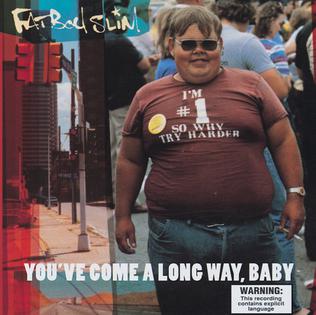
You've Come a Long Way, Baby is the second studio album by English electronic music producer Fatboy Slim. It was first released on 19 October 1998 in the United Kingdom by Skint Records and a day later in the United States by Astralwerks. You've Come a Long Way, Baby proved to be Cook's global breakthrough album, peaking at number one on the UK Albums Chart and number 34 on the US Billboard 200. Praised by critics for its sound and style, the album brought international attention to Cook, earning him a Brit Award in 1999, and was later certified four times platinum by the BPI and platinum by the RIAA. Four singles were released from the album: "The Rockafeller Skank", "Gangster Tripping", "Praise You", and "Right Here, Right Now", all of which peaked within the top ten on the UK Singles Chart. "Build It Up – Tear It Down" was also released as a promotional single.
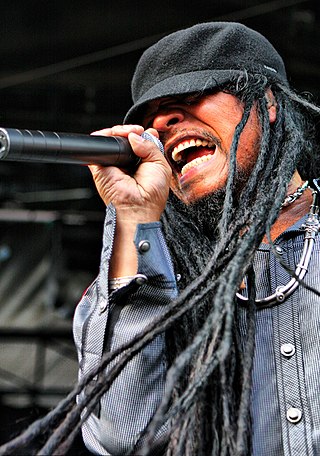
Max Alfred Elliott, known by his stage name Maxi Priest, is a British reggae vocalist of Jamaican descent. He is best known for singing reggae music with an R&B influence, otherwise known as reggae fusion. He was one of the first international artists to have success in this genre, and one of the most successful reggae fusion acts of all time.

"Can't Help Falling in Love" is a song written by Hugo Peretti, Luigi Creatore, and George David Weiss and published by Gladys Music, Inc. The melody is based on "Plaisir d'amour", a popular French love song composed in 1784 by Jean-Paul-Égide Martini. The song was initially written from the perspective of a woman as "Can't Help Falling in Love with Him", which explains the first and third line ending on "in" and "sin" rather than words rhyming with "you".

"Red Red Wine" is a song originally written, performed and recorded by American singer Neil Diamond in 1967 that appears on his second studio album, Just for You. The lyrics are written from the perspective of a person who finds that drinking red wine is the only way to forget his woes.

The Very Best of UB40 1980–2000 is a greatest hits album of the British dub/reggae band UB40.

Rat in the Kitchen is the seventh album by UB40, released in July 1986. This album contained two UK hits, "Sing Our Own Song" and "Rat in Mi Kitchen". The album itself reached 8 in the UK album charts in 1986 staying in the charts for twenty weeks. The album provoked a positive reception from critics.

Labour of Love is the fourth studio album by British reggae band UB40, and their first album of cover versions. Released in the UK on 12 September 1983, the album is best known for containing the song "Red Red Wine", a worldwide number-one single, but it also includes three further UK top 20 hits, "Please Don't Make Me Cry", "Many Rivers to Cross" and "Cherry Oh Baby". The album reached number one in the UK, New Zealand and the Netherlands and the top five in Canada, but only reached number 39 in the US on its original release, before re-entering the Billboard 200 in 1988 and peaking at number 14 as a result of "Red Red Wine"'s delayed success in the US.
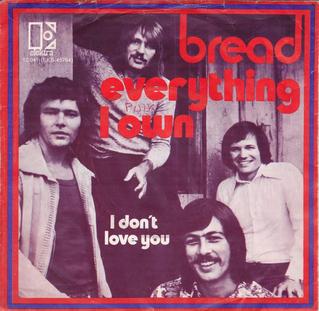
"Everything I Own" is a song written by American singer-songwriter David Gates. It was originally recorded by Gates's soft rock band Bread for their 1972 album Baby I'm-a Want You. The original reached No. 5 on the American Billboard Hot 100. Billboard ranked it as the No. 52 song for 1972. "Everything I Own" also reached No. 5 in Canada and No. 12 in Australia.

The Best of UB40 – Volume One is a compilation album by the British reggae band UB40. It was released in 1987 and includes a selection of the band's hits from 1980 to 1986.
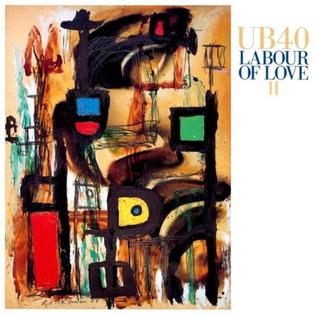
Labour of Love II is the ninth album and second covers album by UB40, released in 1989. The album contained two top-ten Billboard Hot 100 hits – "Here I Am " peaked at No. 7, "The Way You Do the Things You Do" peaked at No. 6 – and "Kingston Town" reached No. 4 on the UK Singles Chart.

Baggariddim is the sixth album by UB40, released in 1985. Most of the tracks are reworkings of previous UB40 recordings that originally appeared on Labour of Love and Geffery Morgan, here showcasing guest singers and "toasters" on vocals. Guest artists included Chrissie Hynde, the leader of The Pretenders, and Douglas Gilbert, lead trombonist with the London Symphony Orchestra (LSO). In the UK, Germany, the Netherlands and Belgium, this album was released in a gatefold sleeve containing an additional 3-track 12" EP. The album features two hits, "I Got You Babe"—a duet with Hynde that reached number one in the UK, Ireland and Australia—and the UK number-three follow-up "Don't Break My Heart", which was the 'B-side' of "I Got You Babe" with vocals added. The album was not released in the US or Canada, where instead an EP entitled Little Baggariddim was released.
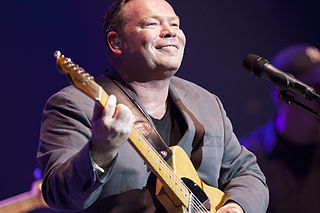
Alistair Ian Campbell is an English singer and songwriter who was lead singer and co-founder of the British reggae band UB40.
Ainsworth Roy Rushton Shirley, better known simply as Roy Shirley, and also known as King Roy Shirley and The High Priest, was a Jamaican singer whose career spanned the ska, rocksteady and reggae eras, and whose "Hold Them" is regarded by some as the first ever rocksteady song. He was also one of the original members of Slim Smith's band, The Uniques.

Love Songs is a compilation album by British reggae band UB40. It was released in 2009 and includes all the love songs from by the band. The album includes 17 solo tracks as well as the 2 tracks that the band performed with Chrissie Hynde from The Pretenders and the Robert Palmer track "I'll Be Your Baby Tonight."
The discography of UB40, a British reggae band, consists of 20 studio albums, 19 compilation albums, six live albums, four remix albums, 65 singles and a number of appearances with other artists.

Labour of Love IV is the seventeenth album and fourth covers album by UB40, released on the Virgin Records label in 2010. It is the first UB40 album not to feature the classic line-up as longtime UB40 vocalist/guitarist Ali Campbell and keyboardist Mickey Virtue both departed the band in 2008; consequently it is the first album by the band to feature vocalist Duncan Campbell.
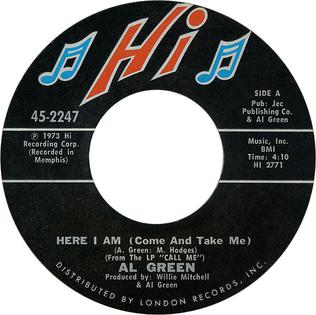
"Here I Am (Come and Take Me)" is a 1973 song by Al Green, the second single released from his album Call Me. The song reached number 10 on the Billboard Hot 100 and number two on the Hot Soul Singles chart. It was certified as a gold record by the Recording Industry Association of America.
"The Train Is Coming" is a song written and performed by Jamaican reggae artist Ken Boothe. It was released as a single in 1966 through Supreme Records. Recording sessions took place at Jamaica Recording Studio in Kingston. Produced by Coxsone Dodd, it featured backing vocals from The Wailers Band.

A Real Labour of Love is the second studio album by UB40 featuring Ali, Astro and Mickey. It peaked at number 2 on the UK Albums Chart, making it the highest-charting UB40 album since Promises and Lies, which reached number-one in 1993.

















